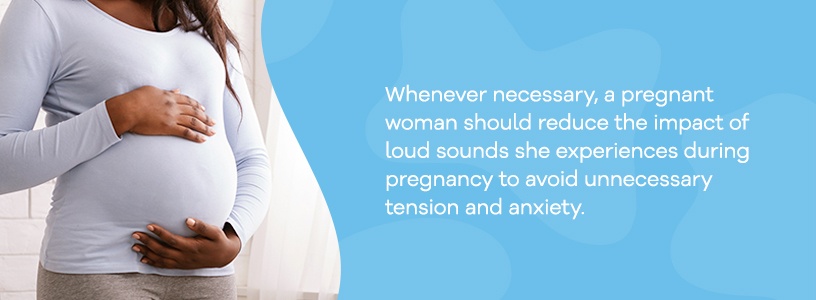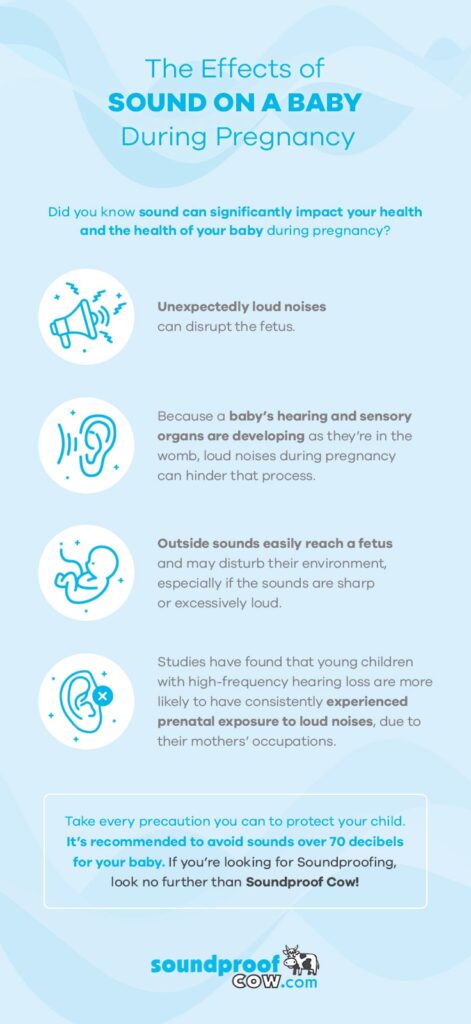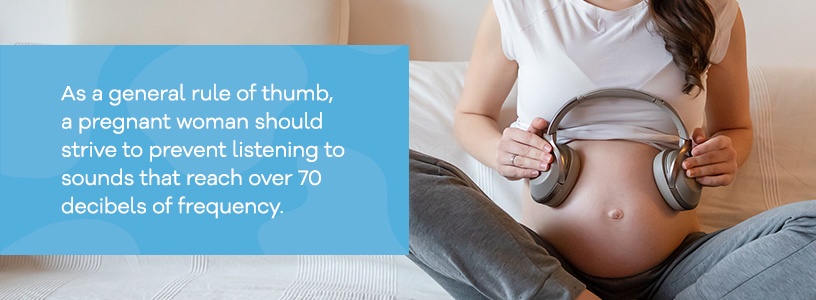
When you’re pregnant, you take extra precautionary measures to ensure your health is in top shape to best protect your unborn child. You may be familiar with the everyday products you should avoid while pregnant, including hair dyes and various chemicals. But did you know sound can significantly impact your health during pregnancy, too?
If you like to blast your music from your car or prefer to listen to your television at a movie-theater-level volume, you might want to put down the remote and reconsider. Women who work in technical fields where loud noises are standard should educate themselves on the potentially harmful side effects sound can have on their child.
Even when the level of noise you hear daily is beyond your control, it’s essential to understand what impact noise has on your body while pregnant to take the proper precautionary measures for added safety and security.
How Loud Noises Impact the Mother
Anyone should strive to eliminate as much stress as possible from their life. For a pregnant woman, this necessity is even more significant because stress can impact both herself and the child she carries. Stress is one of the potentially adverse side effects of loud noise. Whenever possible, a pregnant woman should reduce the impact of loud sounds she experiences during pregnancy to avoid unnecessary tension and anxiety.
Loud noises during pregnancy can also lead to an increased risk of hypertension and gastrointestinal upsets. For many, these symptoms are a byproduct of the stress women experience during moments of intense sound production.
The Effects of Loud Noise on the Baby During Pregnancy
Did you know sound can reach your baby even when they’re still in the womb? Many mothers read or hum to their babies in a soothing tone, hoping that their voices will reach their child’s ears early. Calming sounds during pregnancy can have positive effects, but are loud noises bad during pregnancy?
Unfortunately, a fetus can hear unwanted sounds as well as soothing ones. To learn more about the effects of noise during pregnancy, check out the answers to these two common sound-related questions.
How Can Loud Noises Harm the Fetus?
Unexpectedly loud noises such as firecrackers or loud bangs can disrupt the fetus. The baby’s reaction to these sounds may cause them to move or jolt in the womb. In more extreme cases, thunderous or upsetting noises can also prematurely affect the unborn child’s hearing.
Because a baby’s hearing and sensory organs are developing as they’re in the womb, loud noises during pregnancy can hinder that process. Outside sounds easily reach a fetus and may disturb their environment, especially if the sounds are sharp or excessively loud. Studies have found that young children with high-frequency hearing loss are more likely to have consistently experienced prenatal exposure to loud noises, due to their mothers’ occupations.
There’s also an association between prenatal exposure to loud sounds and lower birth weight. One study found that the birth weights of babies born to mothers who lived in an area that experienced frequent loud aircraft noise were notably below average. Some research has suggested a link between exposure to loud noise during the first trimester of pregnancy and congenital anomalies, such as chromosomal abnormalities and other conditions.
Will Loud Music Affect Pregnancy?
Although there is some correlation between proximity to recurring loud noises and some developmental complications, listening to loud music during pregnancy is not likely to harm the fetus. As long as you keep your music at 70 decibels or lower, there is no risk in playing music while pregnant.
Music played at a low volume may deliver a sense of calmness for both the baby and mother. To get the beneficial effects of listening to music while pregnant, avoid the front row of a rock concert. Stay in, put a soothing song on the stereo and turn it down.
Appropriate Decibel Levels During Pregnancy
Just because a woman is pregnant doesn’t mean she should go out of her way to avoid noise entirely, either. As a general rule of thumb, a pregnant woman should strive to prevent listening to sounds that reach over 70 decibels of frequency. Any soundwave higher than this maximum point puts all adults — pregnant or non-pregnant — at risk of damaging their hearing in the long run.
Recommended Measures for a Healthy Mother and Child During Pregnancy
While a pregnant mother doesn’t have to alter her life drastically in an attempt to avoid loud noises, she also shouldn’t seek situations where loud sounds will be inevitable. It’s crucial for expecting mothers to refrain from traveling to any area where sudden and disruptive noises create the potential for a stressful situation. Avoiding stress will ensure the mother — and baby — a safer pregnancy.
Soundproofing for Added Protection
Whether you plan to add a new member to the family or want a greater sense of peace and calm throughout the day, soundproofing is an excellent way to lessen your daily stress by providing you with the silence you desire.
At Soundproof Cow, we supply noise control products that even the least experienced do-it-yourselfers can complete with ease. For more information on our products or to learn more about our soundproofing materials, we invite you to contact us today.










